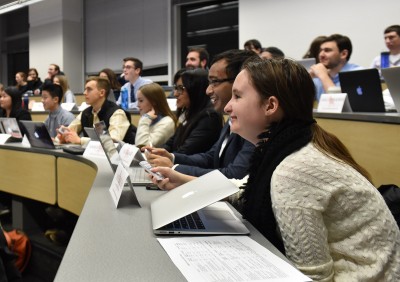
Boston University Student Government convened Monday for its first meeting after winter break and voted to fund TurboVote, a website that eases out-of-state students’ voting registration.
TurboVote’s service normally costs $1.60 for each voting form submitted, but it will be free to BU students if SG pays a fee, Rachel Eckles, deputy director of SG’s City Affairs Department, said at the meeting. The original proposal Eckles, a junior in the College of Arts and Sciences, presented to the senators would have allotted $4,000 for three semesters of TurboVote service.
After debating the original proposal, the senators passed an amended proposal that would allow SG to allocate $2,000 for one semester of TurboVote service, with 29 votes for the proposal, four against and three abstentions. The amendment stated that the Senate would reconsider continuing the service in the future.
Senate Chair Courtney Bold said Senate passing the proposal to fund TurboVote emphasized the importance of government involvement to BU students.
“[Promoting] voting on campus should absolutely be a number one priority for SG,” said Bold, a senior in the Questrom School of Business. “We can’t ask students to be involved with Student Government if they aren’t interested in being involved with their actual government.”
SG President Andrew Cho reiterated the importance of passing the TurboVote proposal. Though the funding seemed hefty to several senators, he said it is important for SG to encourage students to participate in the federal government.
“If we really want to stand behind initiatives that support democracy and supporting these student groups who want to use this service, it would be an honorable use of our money,” Cho, a senior in CAS, said. “Though, it is a large chunk [of money].”
According to the proposal, a number of student groups have agreed to utilize TurboVote’s services, such as Common Sense Action BU, Students for a Just and Stable Future, Questrom Student Government and Generation Citizen at BU.
SG also looks forward to a semester of activities funded by the Senate, Cho said in the meeting. He said he hopes to work with other student groups and the administration to expand the Howard Thurman Center for Common Ground into a larger space, all while involving more students.
Following Cho’s opening address, Bold reviewed procedural actions and etiquette that senators are encouraged to adhere to during Senate meetings. Senators were given a handout that outlined when it is appropriate to interrupt the speakers and in what manner senators could do so.
Daniel Collins, a sophomore in CAS, was also confirmed as Senate vice chair with 35 votes in support and one against.
After the meeting, several senators voiced their support for TurboVote and commented on how Bold, the new Senate chair, ran the meeting.
Sean Kargman, a freshman in the College of General Studies, said the amended proposal was a better decision than the original proposal because it allows SG to see how TurboVote works within the student body before investing heavily.
“In the end, we made the right decision to do a test trial to see how it really was going to work,” Kargman, a West Resident Hall Association senator, said. “If it works well, we will keep going with it, but TurboVote is coming to BU for a semester.”
Lauren Blackburn, a Warren RHA senator, said the senators are adjusting with changes positively, and this semester will be different than the previous semester.
“So much has changed in the Senate,” Blackburn, a freshman in the College of Communication, said. “We got a lot of stuff done, and we are just learning with the flow.”
Anish Guha, a sophomore in Questrom, said the debate in the Senate over TurboVote was important because Senate is becoming more open to all senators’ opinions.
“There was a lot of conflict in Senate today over [TurboVote],” Guha, a Questrom senator, said. “The debate was constructive in the sense [that] we were able to come to a reasonable consensus at the end. These conversations are going to make Senate stronger in the end by having more differing opinions and letting everyone speak their mind.”























































































































